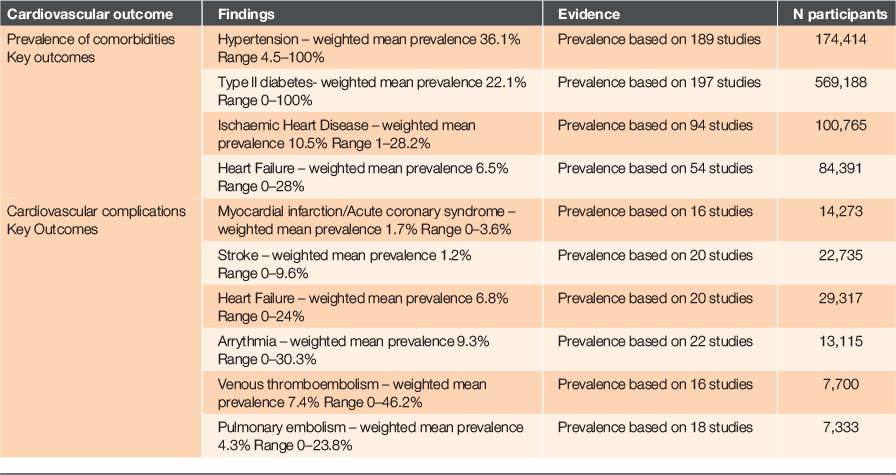Coronavirus (COVID-19): are pre-existing cardiovascular comorbidities associated with COVID-19 severity and what is the rate of subsequent cardiovascular complications?
Vanessa JordanNew Zealand Cochrane Fellow, University of Auckland, Auckland, New Zealand. Email: v.jordan@auckland.ac.nz
Journal of Primary Health Care 13(2) 189-190 https://doi.org/10.1071/HC19562
Published: 29 June 2021
Journal Compilation © Royal New Zealand College of General Practitioners 2021 This is an open access article licensed under a Creative Commons Attribution 4.0 International License
Cochrane Review: Pellicori P, Doolub G, Wong CM, Lee KS, Mangion K, Ahmad M, Berry C, Squire I, Lambiase PD, Lyon A, McConnachie A, Taylor RS, Cleland JGF. COVID‐19 and its cardiovascular effects: a systematic review of prevalence studies. Cochrane Database of Systematic Reviews 2021, Issue 3. Art. No. CD013879. doi:10.1002/14651858.CD013879.1
Background: On 11 March 2020 the World Health Organization (WHO) declared the novel coronavirus (COVID-19) outbreak a global pandemic.2 Existing cardiovascular risk factors such as hypertension have greater prevalence rates in people hospitalised and those who have died from COVID-19 infection.3 Studies have also reported myocardial damage in patients recovering from COVID-19, potentially caused by microvascular and macrovascular dysfunction in conjunction with immune over-reactivity.3 The Cochrane review reported on here, set out to determine the prevalence of pre-existing cardiovascular problems in people with COVID-19 and the existence and prevalence of cardiovascular complications resulting from COVID-19 infection.1
Clinical Bottom Line: This Cochrane review found a high prevalence of hypertension, diabetes and ischaemic heart disease in people hospitalised with COVID-19. This finding is in agreement with what is already known in the literature. The authors from this review also determined that there is a high rate of cardiovascular complications among people hospitalised with COVID-19. The most common complications were arrythmias, venous thromboembolism and heart failure. People suffering from COVID-19 may have experienced cardiovascular complications resulting from severe illness but not necessarily unique to COVID-19, for example intensive care (ICU) admission for pneumonia is associated with the development of arrythmias and heart failure.4

|
References
[1] Pellicori P, Doolub G, Wong CM, et al. COVID‐19 and its cardiovascular effects: a systematic review of prevalence studies. Cochrane Database of Syst Rev. 2021; Art. No. CD013879| COVID‐19 and its cardiovascular effects: a systematic review of prevalence studies.Crossref | GoogleScholarGoogle Scholar |
[2] World Health Organization. WHO Director-General’s opening remarks at the media briefing on COVID-19 11 March 2020.
[3] Guzik TJ, Mohiddin SA, Dimarco A, et al. COVID-19 and the cardiovascular system: implications for risk assessment, diagnosis, and treatment options. Cardiovasc Res. 2020; 116 1666–87.
| COVID-19 and the cardiovascular system: implications for risk assessment, diagnosis, and treatment options.Crossref | GoogleScholarGoogle Scholar | 32352535PubMed |
[4] Corrales-Medina VF, Taljaad M, Yende S, et al. Intermediate and long-term risk of new-onset heart failure after hospitalization for pneumonia in elderly adults. Am Heart J. 2015; 170 306–12.e6.
| Intermediate and long-term risk of new-onset heart failure after hospitalization for pneumonia in elderly adults.Crossref | GoogleScholarGoogle Scholar | 26299228PubMed |


